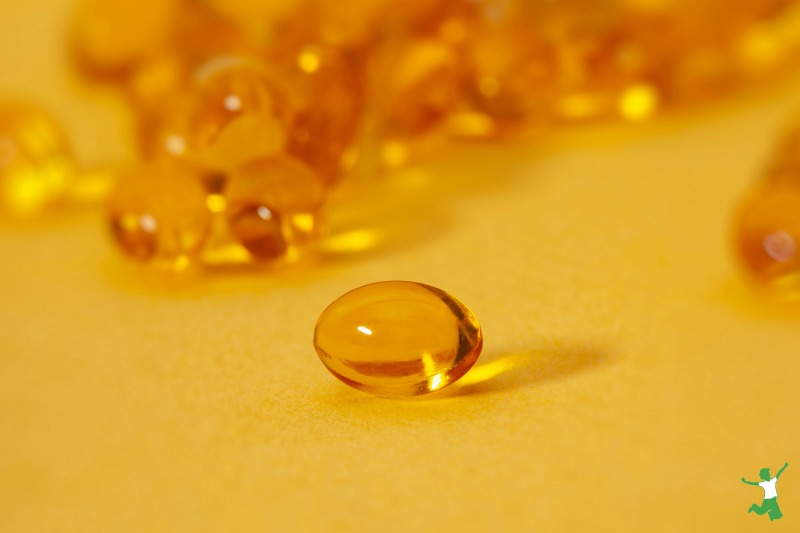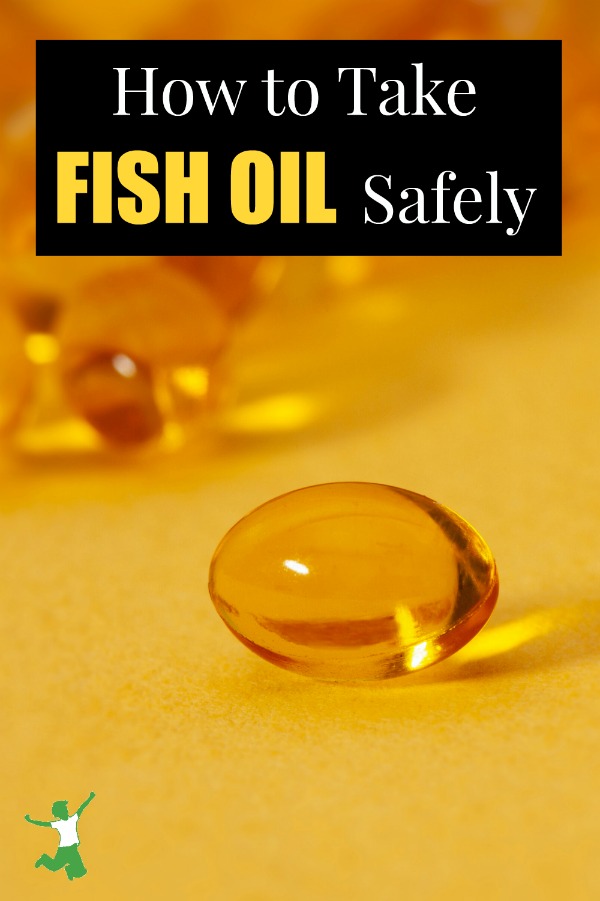Omega-3 fats taken as fish oil are popular for many health conditions, but consumed as part of a conventional diet can actually do more harm than good.

Omega-3 fats are certainly the darling of conventional and alternative medicine alike. Fish oil loaded with heart-healthy “good fats” are flying off the shelves of healthfood stores and are prominently featured on supplement displays in many doctors’ offices.
You can even buy fish oil capsules at Wal-Mart!
Health Benefits of Omega-3 Fats
There is certainly little doubt that omega-3 fatty acids are important to health. According to Dr. Joseph Mercola, omega-3 fats are:
…significant structural components of the cell membranes of tissues throughout the body and are especially rich in the retina, brain, and sperm, in which docosahexaenoic acid (DHA) constitutes 36.4% of total fatty acids. (1)
Conventional sources like WebMD concur, stating that studies have shown that omega-3 fats can: (2, 3)
- Lower blood pressure
- Reduce triglycerides
- Slow the development of plaque in the arteries
- Reduce the chance of abnormal heart rhythm
- Reduce the likelihood of heart attack and stroke
- Lessen the chance of sudden cardiac death in people with heart disease
Fish Oil Contraindications
While there is little dispute on either side of the medical aisle about the necessity of omega-3 fats in the diet for optimal health, consumers need to be aware that there are pitfalls associated with these good fats. This is particularly true for vegetarians or those who otherwise consume a nutrient-poor Standard American Diet (SAD).
First of all, it is not wise to consume the high heat processed, industrialized fish oils that take center stage on supplement shelves at the store and in doctors’ offices. High heat processing destroys the benefits of fish oils. The delicate omega-3 fats are highly subject to rancidity from heat.
In fact, some would argue that taking fish oil does more harm than good as the good fats oxidized by processing become loaded with free radicals and when consumed regularly can contribute to aging and the development of chronic disease.
Even consumers who make the effort to source omega-3 fats rendered with no heat in the form of virgin high vitamin cod liver oil as prized by Traditional Societies such as the South Sea Islanders studied by Dr. Weston A. Price need to exercise caution.
The omega-3 fats EPA (eicosapentaenoic acid) and DHA (docosahexaenoic acid) can actually contribute to health problems when not balanced by other important fatty acids in the diet.
The Journal of Nutrition Research reports that intake of DHA and EPA is associated with an increased risk of hemorrhagic stroke in rats. People on anticoagulant drugs need to be especially careful. EPA and DHA may cause the blood to thin and trigger excess bleeding. (4)

Arachidonic Acid Key to Avoiding Omega-3 Supplementation Risks
How does a savvy consumer obtain the numerous health benefits of omega-3 fats DHA and EPA with no downside risks?
The key is to balance the intake of omega-3 fats in whole foods and traditionally rendered oils with the omega-6 fat arachidonic acid (ARA). Foods rich in ARA include meat fats, eggs, and liver. These are the very foods eschewed by conventional dietary sources…the same ones recommending a daily ration of industrialized fish oil!
It is especially important for pregnant women who supplement with fish liver oils to consume meat fats, eggs (yolks), and liver.
The Weston A. Price Foundation reports that cod liver oil containing substantial levels of omega-3 EPA can actually contribute to hemorrhage during the birth process. (5)
This risk is mitigated by arachidonic acid (ARA), an equally important omega-6 fatty acid found in liver, egg yolks, and meat fats. It is not found in any plant-based foods with the exception of moss and algae. (6)
For this reason, pregnant women taking cod liver oil to benefit themselves and their baby must be sure to follow a Traditional Diet during pregnancy and nursing. Just taking cod liver oil as part of a nutrient-poor, ARA deficient conventional diet is unwise.
So bring on those heart-healthy omega-3 fats! Let’s all be sure, however, to consume them as part of a diet that also includes meat, liver, and eggs as wisely demonstrated by chronic disease-free Traditional Societies.
References
(1) Omega-3 Benefits and Supplementation
(2) Fish Oil Supplements for High Blood Pressure
(3) Omega-3 Fatty Acid Fact Sheet
(4) Polyunsaturated Fatty Acids Increase Oxidative Stress in Rats
(5) Pregnancy and Lactation Diet
(6) Arachidonic Acid Food Sources
More Information







My father had prostate cancer and my brother died from prostate cancer. My PCP, my Dr., has had me on 4000 mg (4 capsules) per day over the last 4 years. I am now quite concerned about aggressive prostate cancer. Other than the PSA blood test, what other tests are available to diagnose prostate cancer.
Yes, it is ultra imprtant to note that if the ratio of omega-3 to omega-6 fats in the diet is too great one invites adverse heath errects rather than reducing or preventing them. I prefer to use whole food sources rather than supplements.
yes, i hears another person say he had horrible pain!
Kathryn Hoogestraat-yecoshenko this is probably why you hurt when you take fish oil
I can’t eat oily fish they repeat on me for days afterwards and make me feel ill, for years ive taken Omega-3 capsules.
Chia is pretty stable
needed a refill but screw it waste of money and I eat eggs every day and a healthy dose of meat often. Thanks
I have new chapter wholemega salmon oil, from my research it’s not heated when processed and the brand is sustainable. Does anyone have more information to share abt new chapters fish oil?
I’m wondering if anyone can shed some light on my situation. I began taking FCLO over a year ago and so I was very excited that when I became pregnant again that I could continue taking it with all of the wonderful benefits. However, on an off during my pregnancy I spotted. Then beginning around 26 wks I began to have more than spotting, within several weeks I had a good amount of blood every now and then. I am planning a homebirth and my midwife suggested we go ahead and have an ultrasound done to rule out any placenta issues. Thankfully, everything looked great and all is normal and I feel fine and baby seems to be doing great. My family follows a Weston A. Price diet and I have been trying to consume all of the food stated for pregnant women. However, I’m wondering if the FCLO has contributed to my spotting and bleeding. At this point, I’m a little scared to take it and I definitely don’t want to hemmorage at home during birth. Any thoughts?
Hi Tina. I HAVEN`t seen any reply to your issue. I HAD THE SAME PROBLEM with my last pregnancy, baby is now 6 weeks. Bled at 9 weeks and stopped taking fclo the only supplement I was taking. My teeth started being sensitive which they are not while I take fclo, and I started taking fclo again BUT I started spotting around 27 weeks. Stopped the fclo and I haven`t spott ed at all for the remainder of my pregnancy. I started taking fclo about 4 weeks post partum and the spotting started again, stopped taking it, the spotting stopped. Now 6 weeks postpartum I took 1 tsp fclo today thinking I will keep taking it regularly from now on but the spotting started again about 5_6 hours after I took it. I wonder what is going on. If anybody has any answers please share. I would really appreciate it. Oh btw I have been taking fclo for the past 3 years with no bleeding issues until I was pregnant. I do eat beef liver regularly, recently about 2-3 times a week, sometimes 4(and it helps with tooth sensitivity). Luiza
I have gut issues as well as no gallbladder and wonder if you can advise me of how I can consume these healthy oils without distressing my digestive system.